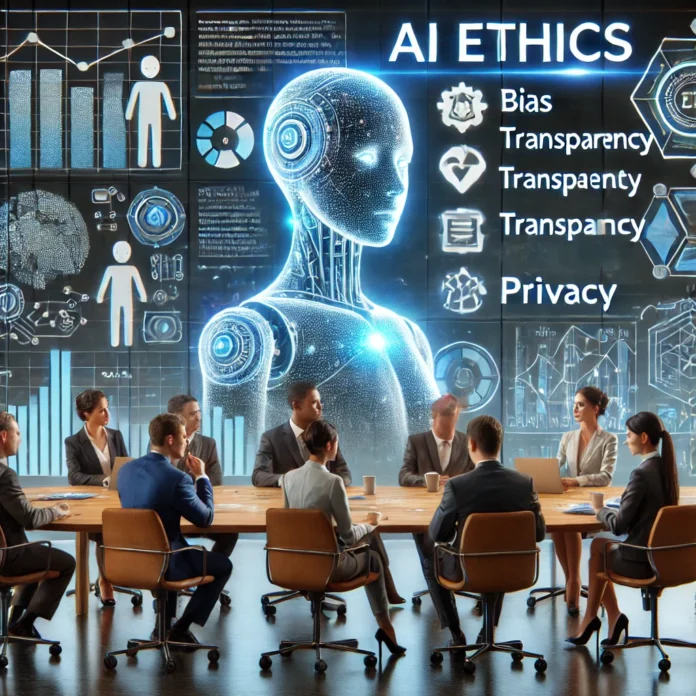Artificial Intelligence (AI) is revolutionizing the business landscape, enhancing efficiency, driving innovation, and providing powerful tools for decision-making. From personalized marketing to automated customer service, AI is woven into the fabric of modern enterprises. Yet, as businesses increasingly rely on AI, ethical concerns arise, posing challenges that go beyond technical performance. These concerns are not just about what AI can do, but what it should do, raising questions of responsibility, fairness, and long-term impact.
1. Bias and Discrimination
One of the most pressing ethical concerns in AI is the potential for bias. AI systems learn from historical data, which can reflect societal biases. If these biases are not properly managed, AI may perpetuate or even amplify discrimination. For example, AI-driven hiring platforms can unfairly favor certain demographics over others, or credit scoring systems may inadvertently disadvantage minority groups.
Key Considerations:
– Diverse Data: To reduce bias, businesses must ensure that AI systems are trained on diverse and representative datasets. Without this, the technology could produce results that are skewed or unfair.
– Continuous Monitoring: Bias can evolve over time, so AI models need regular auditing and updates to ensure fairness in decision-making.
Example: Amazon had to abandon an AI recruitment tool because it discriminated against women by favoring resumes that mirrored the company’s historical hiring patterns, which were predominantly male.
2. Transparency and Explainability
AI systems often function as “black boxes,” making decisions in ways that are not transparent or easily understood by humans. This lack of explainability creates ethical challenges, especially in industries like finance, healthcare, and law, where decisions significantly impact people’s lives.
When an AI system denies a loan, rejects a job application, or recommends a medical treatment, it’s essential for businesses to provide clear explanations of how those decisions were made. Without transparency, individuals are left without recourse to challenge or understand decisions, creating distrust in AI systems.
Key Considerations:
– Explainable AI: Companies need to invest in AI models that can be explained in human terms. This helps build trust and accountability.
– Accountability: Who is responsible when AI makes a mistake? Clear lines of accountability must be drawn between AI developers, users, and the organizations deploying these systems.
3. Privacy and Data Security
AI requires vast amounts of data to function effectively, raising concerns about privacy and data security. Businesses collect and analyze consumer data to fuel AI systems, but improper handling of this data can lead to breaches of privacy or misuse.
AI’s capacity to track, analyze, and predict individual behavior also introduces risks of surveillance and overreach. Consumers may feel that their privacy is being invaded when their personal data is used without consent or when businesses use AI for targeted advertising in intrusive ways.
Key Considerations:
– Data Minimization: Collect only the data necessary for the AI system to function, and avoid storing data longer than needed.
– Informed Consent: Businesses should ensure that customers are fully aware of how their data is being used and obtain explicit consent before collection.
Example: The Cambridge Analytica scandal highlighted how personal data harvested from Facebook users was misused to influence political campaigns, underscoring the ethical pitfalls of data exploitation.
4. Job Displacement and Economic Inequality
While AI promises increased productivity and cost savings, it also poses risks to the workforce. Automation enabled by AI could displace millions of jobs, particularly in industries such as manufacturing, retail, and transportation. This technological disruption could exacerbate economic inequality, as those with higher education and technical skills are more likely to benefit, while lower-skilled workers may find it difficult to transition into new roles.
Key Considerations:
– Reskilling and Upskilling: Businesses must invest in training and development programs to help workers adapt to the changing job market.
– Responsible Automation: Companies should adopt a balanced approach to automation, ensuring that AI complements human workers rather than completely replacing them.
5. Long-Term Impact and Ethical AI Governance
The rapid pace of AI development has outstripped the creation of regulations and ethical standards. This lack of governance raises concerns about the long-term societal impact of AI technologies. Should AI systems have ethical guidelines built into their design? How do we ensure that AI technologies align with human values?
Businesses play a pivotal role in shaping the future of AI. Ethical governance frameworks must be developed to guide the responsible development and deployment of AI systems. This includes adhering to legal standards, ensuring fairness, and prioritizing human well-being over short-term profit.
Key Considerations:
– Ethical Guidelines: Businesses should develop internal ethical guidelines for AI usage and engage in industry-wide efforts to create universal standards.
– Collaboration with Regulators: By working closely with governments and regulatory bodies, companies can help shape policies that promote ethical AI use.
Example: Microsoft has taken proactive steps by establishing an AI Ethics Committee and releasing a set of AI principles to guide the company’s AI development, including fairness, accountability, and privacy.
Conclusion: Navigating the Ethical Landscape of AI
The adoption of AI in business brings tremendous opportunities but also profound ethical challenges. For AI to be a force for good, businesses must prioritize ethical considerations at every stage of development and deployment. By addressing bias, ensuring transparency, protecting privacy, mitigating job displacement, and engaging in ethical governance, companies can create AI systems that serve society responsibly.
Ultimately, the ethical implications of AI are not just technical issues—they are human issues. As businesses continue to embrace AI, they must do so with a commitment to fairness, transparency, and accountability, ensuring that AI benefits everyone, not just a privileged few.




















